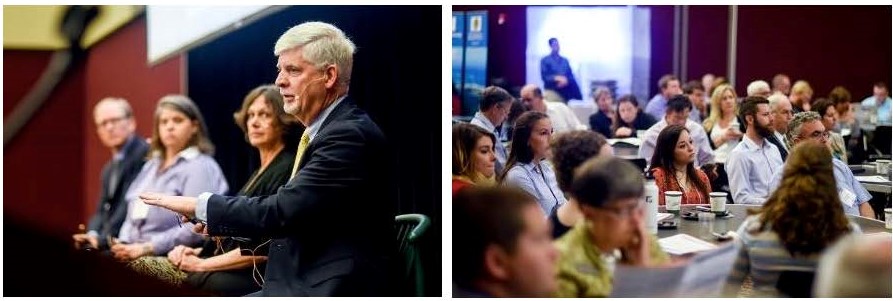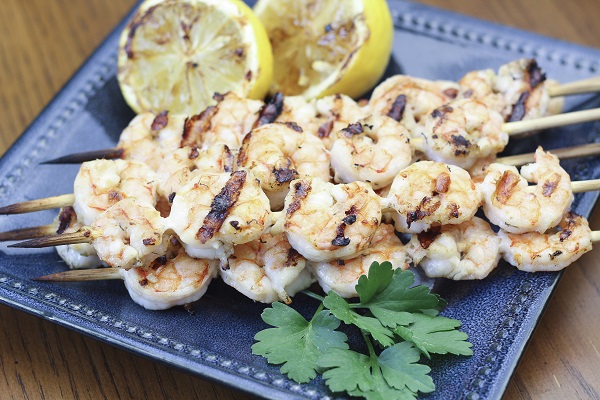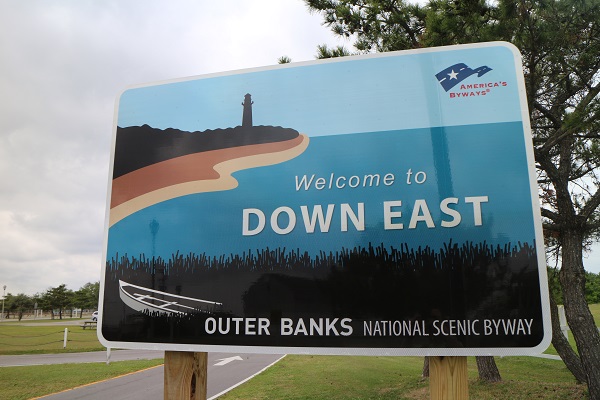CURRENTS: Resilience at the Coast: Conference Features Science and Policy
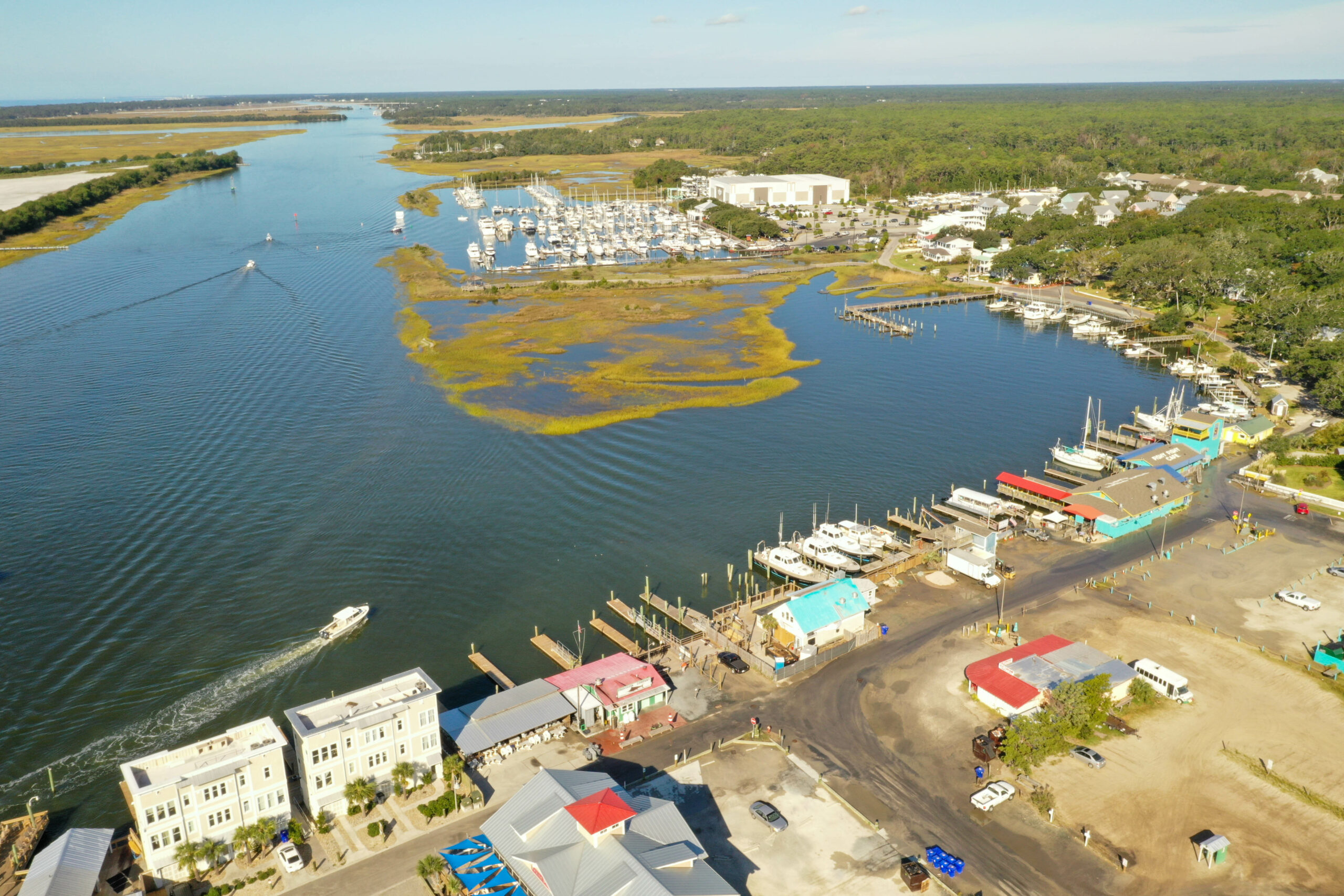
LEFT: Jonathan Pennock (right), director of the National Sea Grant College Program, was a speaker. RIGHT: The conference drew a wide range of participants. Photos by Becky Kirkland/NC State Communications.
A sense of the coast came to Raleigh this spring.
Speakers at North Carolina’s Coastal Conference, hosted by North Carolina Sea Grant, described essential ecosystems and economies, along with coastal communities’ critical challenges.
“We are thrilled that our sessions included leaders from the National Oceanic and Atmospheric Administration and state agencies, along with researchers, students, policymakers, residents and business owners. All came ready to learn and share ideas,” notes Susan White, Sea Grant’s executive director.
The program opened April 4 with a plenary that considered resilience issues from national and state perspectives, while the closing session on April 5 looked at ongoing recovery from Hurricane Matthew.
An evening program at the N.C. Museum of Natural Sciences featured legislative leaders — N.C. Rep. Pat McElraft and N.C. Sen. Bill Cook — and a reading by author Bland Simpson of the University of North Carolina at Chapel Hill.
Overall, about 200 people attended the sessions that included panels on topics such as weather, storms and climate; community and ecosystem health; fisheries and aquaculture; and planning and economies.
In exit surveys, participants cited the opportunity to network with a broad range of people involved in coastal issues — including researchers, business owners, town managers and community members — as a major benefit of the conference. For many, this was the first experience of cross-cutting presentations and audience.
Sea Grant is developing a request for research proposals based on the 2017 conference. “Continue to check our home page and social media for updates, as well as the conference website for new materials, including presentation slides,” White says.
FUTURE LEADERS
White notes with particular pride the roles of university students in making the event a success, including those who volunteered, hosted tool tables, offered live tweeting, posed questions to the speakers, and, of course, shared their research results during a poster session.
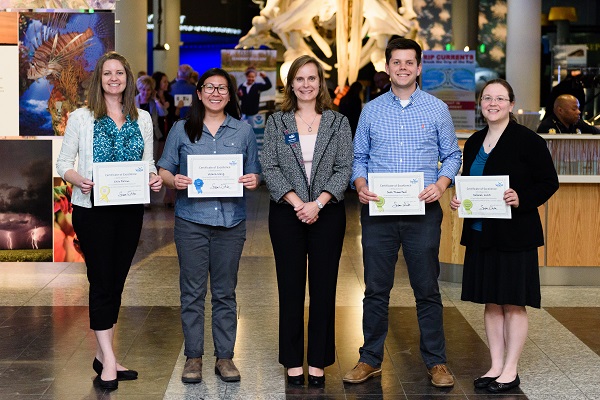
“The students and professionals were well engaged throughout the event. I was impressed with the depth of understanding the students have not just of a single discipline, but also of how research needs today cross over from physical sciences to social sciences to policy decisions, and even the arts, in order to look at the big picture,” White adds.
Several students received awards based on poster content and design, how well they explained their research, and the implications and relevance of the project results.
“We received submissions from a diverse group of students, many of whom we had not interacted with previously,” says John Fear, Sea Grant deputy director. “The winners exemplified the great body of ongoing research across the University of North Carolina system.”
The poster winners were:
• First place: Verena Wang, University of North Carolina Wilmington, Estimating Southern Flounder Population Connectivity Using Otolith Geochemistry.
• Second place: Liliana Velasquez Montoya, NC State University, Oregon Inlet: Can We Solve the Unresolved Morphological Puzzle?
• Third place: Shilo Felton, NC State, Managing American Oystercatcher (Haematopus palliates) Population Growth by Targeting Breeding Season Vital Rates.
• Honorable mention: Deborah Lichti, East Carolina University, Are All Rivers Created Equal? Determining How Food Web Dynamics Affect Fish Nursery Habitat.
• Honorable mention: Seth Theuerkauf, NC State, Density-Dependent Role of an Invasive Marsh Grass, Phragmites australis, on Ecosystem Service Provision.
EFFECTIVE PARTNERSHIPS
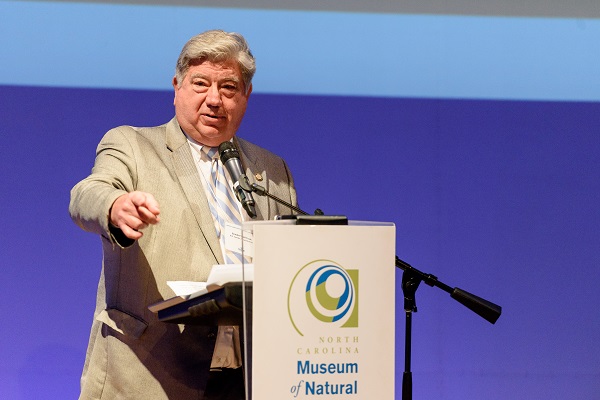
White also cites the strong support of varied partners. For example, NOAA is the agency for the National Sea Grant College Program.
“North Carolina State University hosts the headquarters for Sea Grant, but our program is truly statewide, as shown in the range of partners on the event steering committee and our overall advisory committee,” she explains.
The conference also drew the attention of the N.C. congressional delegations, including key staff members for U.S. Sen. Richard Burr and Sen. Thom Tillis, along with U.S. Rep. David Price. “Others were very interested but ended up with schedule conflicts,” White added.
“I again extend great thanks to our wonderful sponsors for supporting this opportunity for Sea Grant, our researchers, students and partners from across the state to discuss a range of critical issues — and solutions for a healthier coast,” she notes.
The conference sponsors include:
• Emerald: NC State Office of Research, Innovation and Economic Development, East Carolina University, University of North Carolina at Chapel Hill and the University of North Carolina system.
• Sapphire: NOAA’s Office for Coastal Management, Atlantic ReefMaker.
• Ruby: Duke University Marine Lab.
• Crystal: Albemarle-Pamlico National Estuary Partnership and UNCW Coastal and Marine Sciences.
For more information on speakers and other conference details, go to ncseagrant.ncsu.edu/nc-coastal-conference. Find more conference photos at go.ncsu.edu/or54yn.
This article was published in the Summer 2017 issue of Coastwatch.
For contact information and reprint requests, visit ncseagrant.ncsu.edu/coastwatch/contact/.
- Categories:
